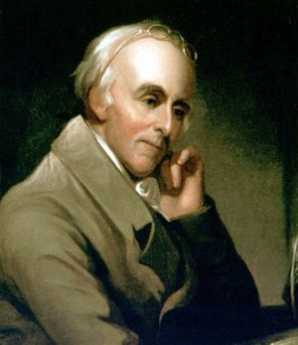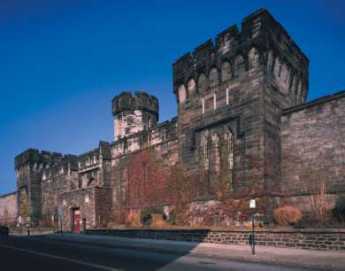Related Topics
Outlaws: Crime in Philadelphia
Even the criminals, the courts and the prisons of this town have a Philadelphia distinctiveness. The underworld has its own version of history.
Philadelphia Medicine
The first hospital, the first medical school, the first medical society, and abundant Civil War casualties, all combined to establish the most important medical center in the country. It's still the second largest industry in the city.
Philadelphia Legal Scene
The American legal profession grew up in this town, creating institutions and traditions that set the style for everyone else. Boston, New York and Washington have lots of influential lawyers, but Philadelphia shapes the legal profession.
Quakers: The Society of Friends
According to an old Quaker joke, the Holy Trinity consists of the fatherhood of God, the brotherhood of man, and the neighborhood of Philadelphia.
Quakers: William Penn
Although Ben Franklin gets more ink lately, William Penn deserves at least equal rank among the most remarkable men who ever lived.
Right Angle Club 2007
A report, to the year 2007 shareholders of the Right Angle Club of Philadelphia, by the outgoing president.
Volunteerism
The characteristic American behavior called volunteerism got its start with Benjamin Franklin's Junto, and has been a source of comment by foreign visitors ever since. It's still a very active force.
Indigents
With a long history of welcoming and assisting the poor, Philadelphia has always risked swamping the lifeboat by attracting more of them than it can handle.
Quaker Values and Service
New topic 2016-12-03 20:19:53 description
Wister-Wistar
Wistar-Wister
Pennsylvania Prison Society

|
| Duke of York |
William Penn, who spent considerable time in British prisons, established a penal code for his new colony which largely swept away the draconian punishments established by the code of the Duke of York. Until as late as 1780, jails were mainly confinement hotels for debtors, prisoners awaiting trial, and witnesses. For actual punishment, the methods were execution and flogging. Penn's Code for Pennsylvania restricted execution to the crime of murder, and flogging to sexual offenses; everything else was punished by fines and imprisonment. Hidden in this code, of course, was the need to invent and construct prisons to service the imprisonment. It would take over a century to address this need, and Philadelphia still has not completely caught up with the need for more prison cells. Without a prison system, the Penn code was impractical, and the colonial penal code retrogressed toward floggings, pillories, and hangings after Penn's death.

|
| Dr. Benjamin Rush |
In colonial Philadelphia, the main prison was on Walnut Street, with sixteen cells. A neighboring Quaker, Richard Wistar, started a soup kitchen in his own home, taking the soup over to prisoners. By 1773, he had established the Pennsylvania Society for Assisting Distressed Prisoners, which was unfortunately disbanded by the occupying British Army in 1777. In 1783, Dr. Benjamin Rush with the assistance of Benjamin Franklin, Bishop White, and the Vaux family, founded the Philadelphia Society for Alleviating the Miseries of Public Prisons, which after a century changed its name to the Pennsylvania Prison Society. The Prison Society believes it is the oldest continuous non-profit society in America.

|
| Eastern State Penitentiary |
The Prison Society has had several major changes in direction. The original concept was to substitute public labor for imprisonment, a less costly arrangement than imprisonment while avoiding a return to floggings and dismemberment. However, the degrading sight of prisoners in chain gangs caused a public outcry, and the approach was abandoned. In the spirit of the French and American revolutions, loss of liberty was seen as the greatest punishment conceivable. Added to this was the Quaker concept of inspiring remorse through silent meditation, and the eventual outcome was the construction of the Eastern State Penitentiary on what was then called Cherry Hill. In 1823, it was ominous that Eastern State Penitentiary was the largest structure in America. Although the concept was widely admired and imitated, the prolix Charles Dickens took a violent dislike to the idea of never talking to anyone, and led a reversion away from penitentiaries back to simple prisons. In the days before Alzheimers and schizophrenia were well characterized, the spectacle of massive recidivism was added to the rumor that protracted solitude led to insanity.

|
| Catherine Wise |
From Catherine Wise the Communications Director of the Pennsylvania Prison Society, the Right Angle Club recently learned that the current evolution of the American penal system has led to a steady state, but a troubled one. There are 2.2 million inmates in American prisons today, more than any other nation including Russia and China. Of these, 75,000 are confined in Pennsylvania, 9,000 in Philadelphia. Recidivism is 67%, the cost is $31,000 per year per inmate, the majority of inmates have been involved with illicit drugs, a growing number are infected with HIV and Hepatitis C, mental illness runs around 20%. The cost of incarceration is growing faster than the cost of either education or healthcare for the community. Prison overcrowding is extremely serious, the programs for managing parole and integration back into society are weak and underfunded. Eighty percent of the inmates are non-white, most prisons are located in remote regions too far for easy visiting, medical care in prison would not seem at all acceptable in general society. The Prison Society has no difficulty finding projects which are urgently needed. Just for an example, take the peculiar prison statistics; it really seems improbable that only 9,000 of the 75,000 Pennsylvania prisoners are in Philadelphia. Then reflect, NIMBY, that no one wants a prison or its visitors near his home, except areas of rural poverty welcome the employment a prison brings. Reflect for a moment that "jails" are paid for by local county taxes and contain prisoners with less than two years to serve. "Prisons" are paid for with state taxes, and contain those sentenced to longer than two years. Finally, add the fact that nonvoting Philadelphia prisoners in rural prisons are counted by the census as residents of the rural area for the purpose of distributing legislative and congressional seats. The rural politicians love the system, the urban neighbors love to be rid of the prison environment, but the prisoner families can't visit the prisoner. Who cares? Who even notices?
During the first World War, Quaker interest in prison matters was greatly stimulated by the imprisonment of many Quaker conscientious objectors to the wartime draft; since that time prison conditions have again become a central interest of the religion. It's hard to prove but is confidently asserted, that violence and mistreatment of prisoners are appreciably less in Pennsylvania than the rest of the country, California for example. In any event, The Pennsylvania Prison Society is a particularly effective advocate for humane treatment because of credibility achieved over two centuries, with newspaper editors on its board, and sympathetic affiliations with the legislative judicial committees. It knows what it is talking about, as a result of over 5000 annual prison visitations, and it has served the prison administrative corps by performing volunteer work, accepting contracts for parole projects, arranging bus trips for prisoner families to remote prisons, and working for improved funding for prisons. At the moment, there are six highly imaginative bills before the Pennsylvania Legislature, devised and researched by this outside organization with credibility, and political clout. Although the Society takes an occasional contract for a project, it is itself entirely funded by outside contributions, and because of occasional adversarial situations, asks for no funds from the state. Even the contract funds have been questioned, and are only accepted when the working relationships fostered are more useful for the prisoner clients than any co-option which might result.
One final word about medical care in prison. It's not as good as medical care for non-prisoners, and unfortunately it probably never can be. The remote rural location of prisons makes it difficult to obtain physicians and nurses, regardless of wage levels. It's dangerous to be around prisoners, as any guard will tell you, and it's more dangerous to be in control of narcotics amidst a population of addicted convicts. Malingering is nearly universal, both to obtain desired drugs and to spend "easy time" in the infirmary. Many prison escapes are engineered around the necessarily weakened security of the medical system. The prison budgeting system has all the rigidity and weaknesses of any governmental medical system, and in this case, it's run far out of sight of the public. Even the bureaucrats in charge are victimized by other bureaucrats. The average duration of incarceration in Pennsylvania is longer than in most other states; the prisons have to keep mental patients because the mental hospitals have all been closed. Fifty years ago, when there was no place to put a non-criminal with tuberculosis, he was put in jail. The parole system is underfunded, there is not nearly enough community support to absorb ex-con. Behind all this is a shortage of prison facilities. The legislature has got itself into a position that if it moved more prisoners into the outside, more prisoners would just fill the vacancies, costs would go up, and things wouldn't look much better. Only after the backlogs have been absorbed, would there be much visible effect.
Originally published: Friday, June 29, 2007; most-recently modified: Friday, May 03, 2019
| Posted by: Kathy | Dec 16, 2012 12:03 PM |
| Posted by: chryztof knecht | May 13, 2012 11:54 AM |
| Posted by: Hal Smith | Dec 26, 2009 12:49 PM |
You must be kidding me?
Do you have any records that indicate that prisoners who went crazy at ESP were the elderly or the insane? Is it possible that prisoners who were able to survive 3 years in this 'humanitarian experiment’ were considered lucky and a 5 year survival rate was that of a very strong willed individual. Isn’t it true that the prison was forced to do away with this experiment because a good portion of the prisoners were indeed going mad not because of the above rumor but because of the inhumane treatment. My great, great grandfather spent 3 years in this hell hole and was eventually hanged in Bloomsburg PA as a Mollie Maguire. He was an innocent man and, like most of the Mollies’, was railroaded with the help of the enlightened clergy of Philadelphia County. Eastern State Penn housed not only petty criminals but political prisoners as well. I doubt that people who went crazy always fit your profile of Schizophrenics and the elderly.
Eastern State Penitentiary should be leveled a la Abu Ghraib prison and Guantanimo.
| Posted by: Pete Doyle | Jul 28, 2009 1:16 PM |
| Posted by: karen | Apr 8, 2009 7:14 AM |
| Posted by: LaMonica | Mar 30, 2009 7:09 AM |
| Posted by: kyle ulen | Nov 11, 2008 8:18 PM |
| Posted by: George Fisher | Jun 3, 2008 12:39 PM |
posted by Betty Turner May 31, 2008
| Posted by: Betty Turner | May 31, 2008 9:48 AM |
| Posted by: George Fisher | Aug 6, 2007 12:07 PM |
| Posted by: Jean Curry | Aug 6, 2007 10:22 AM |